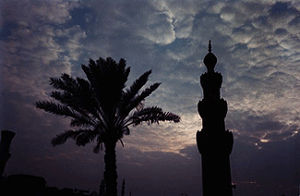 |
 |
 |
|
|||
|
Baksheesh by Rolf Potts, 1/4/2002
I'm riding a second-class train up the Nile valley when a boy in an official-looking blue jacket beckons me to the other side of the carriage. "Look," he whispers, pointing outside. "Beautiful!" I look out the window to see a red sun streaking the sky with bands of pink and yellow. Beyond the train tracks, the mighty Nile glitters with orange spangles of light. It truly is beautiful. As I soak in the colors, I wonder why the boy has taken the trouble to show me such a simple moment. It's not long before I get my answer. "Please," he says giving me a solemn look. "Baksheesh." For a moment, I'm not sure how to react. After all, baksheesh may be an accepted Eastern form of tipping -- but this is the first time I've been asked to pay for a sunset. When Mark Twain visited the Pyramids in 1866, he reportedly suffered "torture that no pen can describe" from the various Egyptian pleas for baksheesh. One hundred years before that, a French visitor complained bitterly about the amounts of baksheesh it took just to dig up and steal a decent mummy. These days -- while its no longer legal to climb the Pyramids or rifle through mummy pits -- baksheesh is still a thriving racket wherever tourists are found. Take my recent visit to Luxor. Whenever I took out my map, some enterprising soul would hustle over and offer me directions. Whenever I entered a tomb, children would fight over who got to fan me with a piece of cardboard. Had I been eating corn on the cob, I'm sure one of them would have produced some dental floss. If there is any saving grace about baksheesh, it's that Egyptians use it among themselves as well as on tourists. Most Egyptians earn low wages, so tips and payoffs are seen as a way to provide incentive and supplement an income. Nobody in Cairo, it is said, can get basic services such as mail or electricity without slipping a little baksheesh to the right people. So, as with any local custom, the best way to get the hang of baksheesh is to watch how the natives do it. Thus, I no longer hesitate to plunk down a few piasters when I get fast and friendly service in a coffee shop, or when the baggage-handler climbs on top of the bus to fetch my bag. In the end, the baksheesh ritual becomes a matter of trusting your instincts and acting like you know what you're doing. And this is why I reach into my pocket and give the boy in the blue jacket 50 piasters. After all, 15 cents isn't such a bad price to pay for a sunset -- and I might have missed it otherwise.
Rolf Potts is an award-winning travel writer who is coming out with his new book on
vagabonding later this year.To see more of his photos, visit his Web site, http://rolfpotts.com. |
 | American Public Media Home | Search | How to Listen ©2004 American Public Media | Terms of Use | Privacy Policy |
